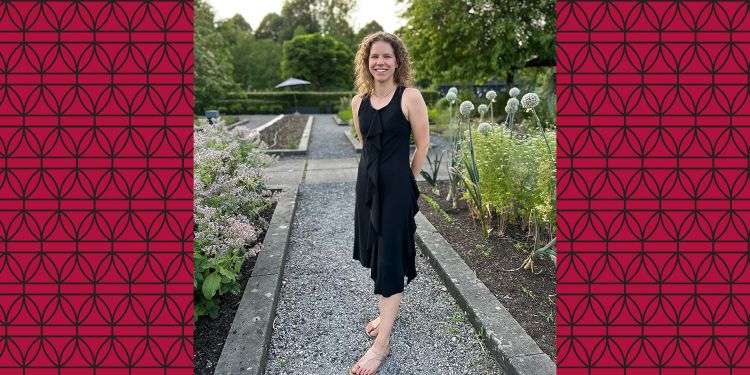In our Alumni Career Journey series, we spotlight inspiring HBS graduates who are leveraging their business and leadership skills to make a significant impact in tackling climate change. Join us as we explore their diverse career paths, innovative solutions, and invaluable insights from the front lines of climate action. In this post, we hear from Margot Zuckerman (MBA 2024), a 2024-2025 Leadership Fellow and Deputy Director of Special Projects at the MBTA.
Tell us about your career journey before attending HBS. Have you always worked in climate-related roles and, if so, how did your roles or focus evolve? If not, how did your journey lead you to pursue a career in climate?
After studying environmental science and economics and researching the environmental and social impacts of food systems, I hoped my first job out of college would be in a corporate sustainability role in the food industry. While I didn’t manage to land a sustainability-specific role, I joined procurement at Kraft Heinz, seeking to learn more about food supply chains—an area with huge potential climate impact. In procurement at Kraft, I also got a crash course in negotiation, stakeholder management, and project management. I also led a few internal sustainability initiatives, like building a supply chain risk visibility tool and scouting for supplier innovation to support our plant-based product development pipeline. As my learning and impact began to cap out, I applied to HBS to reorient toward a climate-focused career. Since beginning at HBS, I’ve worked at an agtech startup, at the U.S. Department of Energy, and in public transit, and it’s been gratifying to get to work on climate challenges from so many angles.
What motivated your decision to pursue your MBA at HBS?
I always planned to go to grad school—initially eyeing programs in supply chain or sustainability—but ultimately felt an MBA would offer the range I wanted to develop both “soft” and technical skills plus test various hypotheses about my career path. HBS stood out to me because of how core the case method is to its MBA experience and because I’d be surrounded by a diverse group of future leaders across the business, nonprofit, and government sectors. Even if the majority of HBS students aren’t gunning for climate-oriented careers, I hoped for plenty of practice persuading my peers—and future colleagues and counterparts—to prioritize climate issues. While at HBS, I was able to build out my climate expertise by taking courses like Professor John Macomber’s “Cities, Structures, and Climate Shocks” and Professor Vikram Gandhi’s Immersive Field Course (IFC) “Development while Decarbonizing: India’s Path to Net-Zero"; conducting research with Professor Rosabeth Kanter on climate action in cities; and participating in the Sustainability, Food & Agriculture, and Energy & Environment clubs, along with organizing panel discussions for the 2023 and 2024 Climate Symposiums.
As the Deputy Director of Special Projects at the MBTA, how do you see your current role and/or organization having an impact on climate change?
At the MBTA, the link to climate may seem simple: every person we get out of a car and onto a bus, train, or ferry helps reduce greenhouse gas emissions (plus contributes to a more equitable, livable, and lively region). The details of climate-oriented work at the T though, are not so simple. As Massachusetts’s largest energy user, and with infrastructure highly vulnerable to climate change impacts, the T faces critical, constant decisions of how to allocate resources—to expand our renewable energy program, to harden our assets against climate change, and/or to increase the safety, reliability, and speed of service. I’ve been grateful to work on all parts of this quandary. I’ve helped improve and expand the MBTA’s renewable energy operations, prepare the MBTA for hotter summers, and enable a few departments to operate more effectively. It’s particularly rewarding to understand that each operational improvement, no matter how big or small, helps drive ridership, and thus is a climate “win.”
You were part of the 2024-2025 Leadership Fellows program. What drew you to this opportunity, and what impact has it had on you?
If it weren’t for the Leadership Fellows program, I likely wouldn’t have joined a government organization this year. The fellowship provided an accessible and meaningful route to tackle complex challenges in the public sector, particularly for somebody with no prior government work experience. At the MBTA, I’ve learned what it takes to effect change in a large, complex, and often chaotic organization: empathy, humility, persistence, and lots of hard work (at minimum). Moreover, the Leadership Fellows Program has been an outstanding opportunity to get to know and deepen relationships with some of the most thoughtful, kind, caring people I’ve met at HBS. The support system provided by my peers, the Social Enterprise Initiative, and HBS Fellows alumni (a special shoutout to the other fellows at the MBTA!) was unexpected but has provided me tremendous value during this transitional year.
What advice do you have for students pursuing careers at the intersection of business and climate change?
Think about your marginal impact. If there are 100 people clamoring for one role—say, in corporate sustainability—how will your unique skills and background enable you to create more impact than the next candidate? Alternatively, is there a role more uniquely suited to you, where your contribution could drive impact that otherwise may not happen? Keep in mind that “climate” doesn’t need to be in your title. Consider identifying a role—or part of your role—with significant levers for impact, whether that’s as a budget owner, product lead, or operations manager, and wield your HBS-refined soft and technical skills to integrate climate considerations into your company’s core priorities. Also, don’t sleep on the public sector.

